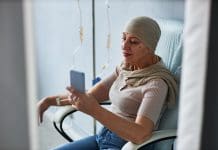A major international study has shown that a structured exercise regime can significantly reduce the risk of colon cancer
Researchers from Queen’s University Belfast conducted a world-first trial involving 889 people with colon cancer from six different countries, including the UK, investigating the impact of exercise on the risk of colon cancer.
The findings are detailed in the New England Journal of Medicine.
Patients took part in a three-year exercise programme
The researchers monitored the impact of a structured physical activity programme for people recovering from colon cancer treatment, compared to those who were offered just health education materials.
The exercise program, which lasted for three years, was a structured physical activity regime tailored to each individual’s needs. Patients regularly met with a physical activity consultant, with the frequency of sessions decreasing over time. For the first six months, patients received weekly in-person coaching sessions. This was then reduced to one session per month, either in-person or online. The exercises varied from a brisk walk to circuit classes, depending on the patient’s fitness level and preferences.
80% of patients remained free of colon cancer
The study revealed that after five years, 80% of people in the structured exercise group remained cancer-free, compared with 74% in the health education materials group. This means the risk of dying, cancer coming back, or developing a new cancer was over a quarter (28%) lower in the exercise group.
Moreover, the study found that after eight years, the overall survival rate was 90% in the structured exercise programme group, compared to 83% in the health education materials group. Patients who participated in the structured exercise programme had over a third (37%) lower risk of death, highlighting the long-term benefits of the program.
Professor Vicky Coyle, UK lead researcher for the trial and Clinical Professor at the Patrick G. Johnston Centre for Cancer Research Queen’s University Belfast, emphasised the individualised approach to exercise in the trial. She said: “During the trial, we supported people to reach their weekly exercise target in a way that worked for them. This could be a brisk walk for around 40 minutes every day, but some patients were also doing circuit classes, cycling, swimming, and many other activities. This individualized approach empowers patients to take control of their health and well-being.”
“Our study gives clear, encouraging evidence that physical activity can reduce the risk of cancer returning for some people with colon cancer. We now need to work with policymakers and healthcare providers to embed exercise into treatment plans where appropriate.”
Caroline Geraghty, Senior Specialist Information Nurse at Cancer Research UK, said: “Being active has many benefits, and this study shows that exercise doesn’t only improve wellbeing – it can also boost people’s chances of surviving colon cancer.
“Everyone recovering from cancer should have access to tailored support to help them live longer, better lives. This trial has the potential to transform clinical practice, but only if health services have the necessary funding and staff to make it a reality for patients.
“It’s important to remember that every cancer journey is different – starting new activities after treatment can feel overwhelming, and it may not be the right option for everyone. Take things at your own pace and speak to your doctor to discuss what is safe for you.”
Dr Joe Henson, Associate Professor in Lifestyle Medicine at the University of Leicester: “These exciting results highlight the power of exercise to reduce the risk of cancer returning and improve people’s quality of life. Leading the exercise sessions in Leicester, I saw firsthand that this reduced fatigue lifted people’s moods and boosted their physical strength. We know that physical activity regulates several key biological processes that could explain these results; further research will help us uncover why exercise has such a positive impact.
“Despite its proven benefits, many people still face barriers to engaging in regular exercise. This study shows how important it is to make exercise advice a routine part of cancer care and to offer people tailored support.”











